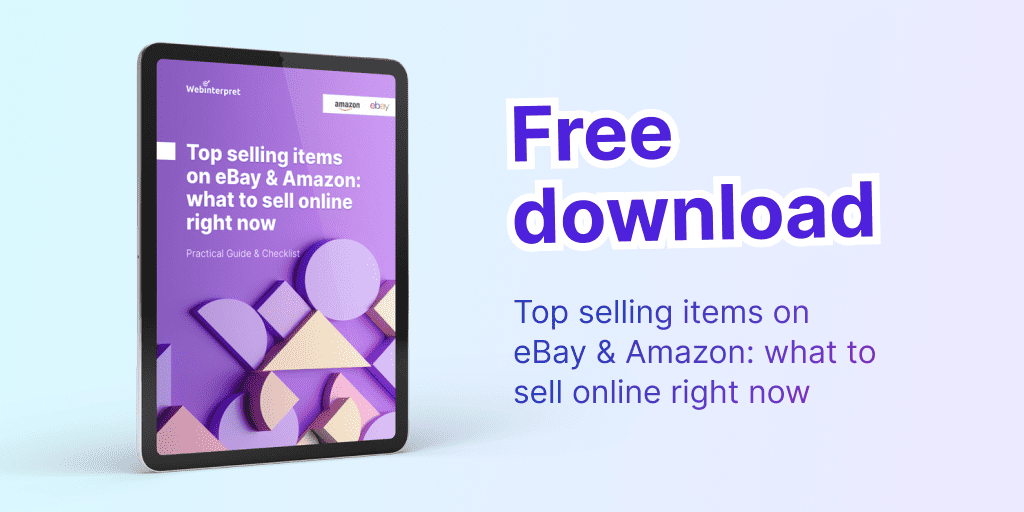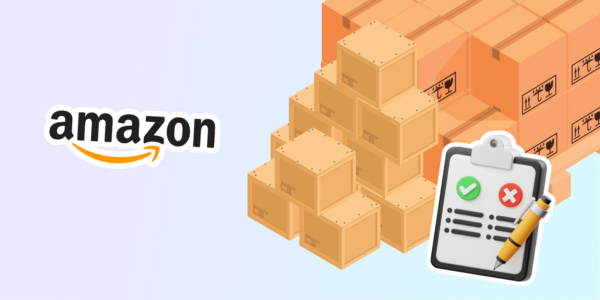
What does Rufus AI launch mean for Amazon sellers?
Amazon’s launch of Rufus, a new generative AI shopping assistant, made headlines in ecommerce news.
Andy Jassy, Amazon’s CEO, said it will revolutionize customer experience for discovery.
But how will Rufus impact marketplace sellers?
How does Amazon’s Rufus AI work?
Rufus is a new generative AI-powered conversational shopping assistant for Amazon buyers.
Its launch was announced on February 1, together with the report of the company’s strong Q4 earnings for 2023: Amazon’s Q4 revenue amounted to $170 billion, while Q4 profits reached $10.6 billion.
Rufus offers Amazon users expert assistance and aims to personalize and further facilitate shopping on the platform.
As Amazon’s CEO, Jassy, said: “It lets customers discover items in a very different way than they have been able to do on ecommerce websites”.
Rufus will allow Amazon shoppers to:
- Learn what to consider while shopping for certain product categories (e.g. “What should I consider when shopping for headphones?”)
- Get help comparing product categories
- Find product ideas and recommendations for different occasions, activities, and purposes (e.g. “What is the best gift for Valentine’s day?”)
- Ask questions about a specific product while on a product page
- Have conversational follow-ups to queries (e.g. “Will this coat be suitable for winter?”)
It will also work with both traditional and voice search.
How will Rufus affect shopping on Amazon?
Is Amazon’s new AI shopping assistant set to change product discovery completely?
Selected customers are already testing the beta version of the AI assistant. While it’s being rolled out to US customers over the course of the next few weeks, it’s a good occasion for Amazon sellers to consider how Rufus will impact them.
We have yet to discover how recommendations made by Rufus will shape product visibility. Certain products might be advised to shoppers more frequently than others.
The real question is: will shoppers’ benefits from Rufus translate to seller benefits?
Rufus launch consequences for marketplace sellers
The fact is that each platform update or new feature introduction can present marketplace sellers with both challenges and opportunities.
Amazon’s traditional search algorithm is already a pretty nuanced tool. In order to determine the relevant search results, it factors in:
- Product titles, descriptions, and images
- Keywords
- Listing performance: impressions, views, click-through rate, conversion rate, as well as off-site traffic
- Product sales history: both organic and PPC sales
- Seller authority, customer reviews
The truth is, Amazon was already constantly tweaking the algorithm to test what makes customers buy more. And those frequent, unpredictable changes were very frustrating to many sellers.
We asked Maxime Morell, an ecommerce strategist, marketplace expert and Amazon account & PPC specialist, about his take on Amazon’s algorithm updates.

Morell’s advice is to “make sure to also closely monitor KPIs like click-through rate (CTR), conversion rate (CVR), percentage of returns, and reviews”, in the light of search algorithm changes.
In fact, the biggest challenge for most marketplace sellers will be adaptability.
However, if you do the research and try to understand any change or update, you will be able to treat them as an opportunity.
Action steps for Amazon sellers
So, how should sellers approach the Rufus launch?
What should they pay attention to? How could it affect their online business?
#1: Understand the architecture of the Rufus product search
Rufus will 100% affect the way in which people discover, research, and buy products on Amazon. It will also influence the customer journey and might make it less linear.
The search experience of shoppers will become more conversational in spirit.
If sellers want to adapt to it, they should start by adapting their listings to such natural queries.
#2: Revise relevant search terms
Revise and optimize Amazon product listings to align with Rufus’s requirements for recommendations.
In order to protect the discoverability of your listings, you need to identify relevant search terms that customers will use while using Rufus. They might differ from the keywords they were previously using and you identified before.
Think about:
- keyword variations
- conversational search queries
- long-tail keywords
- common misspellings
- different product use cases
- different product compatibility
You don’t need to worry about fitting all of them into the listing title. They can be worked into the Amazon bullets or backend keywords.
Backend keywords on Amazon are “hidden” key terms you weren’t able to incorporate on the customer-facing side. For example, if you sell dog accessories, you can include the top 50 or 100 dog breeds as most owners may search “dog collar for Labrador”, etc.
Backend keywords get indexed just like the terms in your bullets and description. This is a good place to type any terms that will compete, long-tail searches, misspellings and words commonly used in your niche.
#3: Optimize product descriptions with Rufus in mind
Enrich product descriptions with not just product features but benefits, too.
An example? Let’s say you’re selling wallets. Describing the wallet as “leather” is its feature. However, the feeling of luxury and quality that it gives – is a benefit.
Product benefits are something that shoppers will be able to ask Rufus to compare.
Customers could ask:
- Which wallet will be more suitable for a businessman?
- What gift would you recommend for a work colleague from the finance industry?
- Which premium wallet brand is timeless?
And so on. If you want to be able to figure out the benefit-centered keywords, try to come up with such common questions. Or – think about common objections that might cause shoppers not to buy the product, and try to address them with keywords that help overcome them.
#4 Prioritize proper localization
If you sell on international markets, make listing localization your top priority. Plain translating and search optimizing your listing on Amazon will no longer be enough.
You will want your products to be 100% optimized in all local languages.
Only high-quality ecommerce localization can ensure that your listings will be culturally tailored to potential Rufus search queries.
It will ensure the human-like quality of the relevant wording and key phrases that a shopper might use when searching for a product.
Pro tip? Make sure also to localize your customer support! After all, Rufus algorithm is also being trained on customer reviews.
#5 Invest in paid ads more strategically than ever
While Rufus is said NOT to be influenced by advertising, it might still be smart to consider investing in it.
Why? Amazon’s AI shopping assistant is still in test mode. While no company will share secret details about their product algorithm, we will be able to understand it better with time.
But before that happens, your listings might be affected by the fluctuating visibility, as well as ranking drops.
Investing in strategically set up paid media and promotion will guarantee your products will stand out, regardless of which listings Rufus decides to recommend.
When it comes to advertising, the right campaign setup and budget allocation are key to achieving optimal results. Sometimes, even small adjustments can pay off with huge benefits.
Conclusion: Adapt to AI-driven Amazon updates
How can all this knowledge help Amazon sellers to prepare for the introduction of Rufus AI?
Understanding how buyers actually search for products and how Rufus will help them do it can be the source of your competitive advantage.
AI is an integral part of ecommerce, whether you want it or not.
Customers want to use AI search to improve their shopping experience, and sellers should use AI-driven tools to keep up with the dynamic competitive ecommerce landscape, increase efficiency, and automate operations.
Revise your usage of AI-driven automated solutions and don’t be afraid to adjust your Amazon strategy accordingly if needed.
Lastly, stay on top of the latest data to make optimal business decisions. It’s worth applying the right strategies for your brand rather than playing hit-and-miss.
After all, this is what could help you drive thousands of potential buyers to your product pages.
About Webinterpret: Expand internationally on Amazon
Webinterpret supports merchants by representing and distributing brands on international marketplaces with its full-stack solution and technology, Marketplace Brand Expansion.
Our AI-powered cross-border solution’s aim is to boost your brand’s global presence effortlessly.
If you want to grow your online sales, book a call with our cross-border experts and review the growth opportunity. They will help you analyze your international sales potential and choose markets that will offer you the best possible return on investment.

Discover AI automation tools that are driving the future of global ecommerce!
Sources
- Amazon announces Rufus, a new generative AI-powered conversational shopping experience
- Amazon CEO Says Rufus Changes What Discovery Looks Like
- Amazon launches AI-powered shopping assistant Rufus
- As Amazon Launches AI Shopping Assistant, Jassy Predicts AI will Drive ‘Tens of Billions’ in Revenue in Coming Years
Related Posts:
Ecommerce Newsletter
By clicking the “Subscribe now” button, you agree to receive our monthly e-mail newsletter and regular marketing and commercial communications by email from Webinterpret regarding marketing trends and our digital marketing services. You confirm that you have read and agreed to Webinterpret’s Terms of Service and Privacy Policy.




